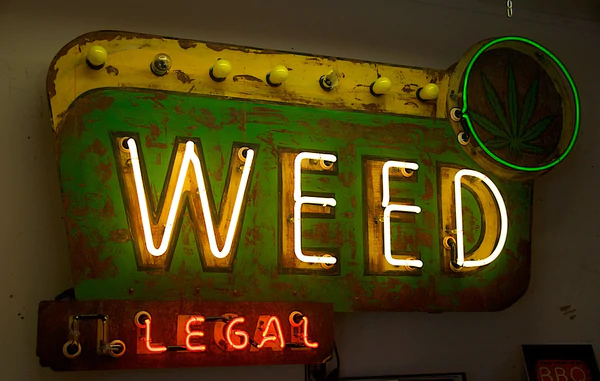Cannabis sponsorship: learnings from commercializing a new category

The Green Rush
Cannabis Legalization and Marketing: Learnings from Commercializing a New Category
Francis Dumais, Co-founder, Elevent
After Uruguay, Canada is only the second country in the world to legalize cannabis. Portugal and the Netherlands have decriminalized it, but it is still not considered a legal substance.
From a marketing perspective, the cannabis market is a world of its own. The product is already widely known and has a massive consumer base. When it was legalized in Canada on October 27, 2018, very large, publicly traded cannabis corporations (collectively worth 47 billion at the time) were overwhelmed and could not meet the massive demand.
This unique marketing environment has triggered interesting strategies and tactics, which are not dissimilar to the ones employed by the tobacco industry when faced with media restrictions in the late 90s and early 2000s—a decisive driver for sponsorship becoming a mainstream communications tool.
Green Summer
Recreational cannabis manufacturers had a unique opportunity to make their brands known before cannabis restrictions were put in place following legalization during the summer of 2018. Some brands used sponsorship, associations with celebrities, experiential marketing, event licensing, and derivative products to build awareness among potential audiences.
For instance, MedReleaf (now Aurora), a medicinal marijuana producer, partnered with Amsterdam Brewery to create the San Rafael ’71 beer—with a 4.20 alcohol percentage. This tongue-in-cheek partnership supports the San Rafael brand, positioned with a 1970s hippy image.
The company has taken a similar approach to marketing its recreational brand, AltaVie, which is aimed at the health-conscious consumer. They created the AltaVie Cannabis Crunch, a chocolate toffee that contains no active ingredients, but has a subtle cannabis flavour. Its commercialisation has focused on shelf presence in over 200 high-end health and natural food stores across the country.
Altavie has also aligned itself with creative events to secure a premium positioning. For example, it created branded venues in Toronto where prospective consumers could discover the products through immersive experiences and tastings of specially crafted herbal tea.
Aurora also created a series of private red carpet events during TIFF and NXNE (North by North-East), where it unveiled the Aurora House—a venue for hosting conferences, concerts and industry events.
Finally, Tweed has relied heavily on short-term partnerships, aligning itself with Pride events across Canada and even the renowned Calgary Stampede. Over the course of the summer in 2018, Tweed sponsored and was present at more than 250 events.
Tweed + Uber + MADD
One could argue that the government had never massively communicated the dangers of driving under the influence of cannabis prior to its legalization.
Tweed jumped at the opportunity to create an educational message and position itself as a responsible player in the industry. The brand partnered with MADD and Uber to launch a campaign with the slogan, “There’s at least 101 better things to do than drive high.” The initiative included a microsite and a media campaign.
Post Legalization: Below the Green Line
The emergence of a new category seemed to promise new revenue sources for our industry—if only legislation around advertising had been aligned with the ones placed on alcohol. However, cannabis restrictions instead mirrored restrictions on in-store tobacco products.
Professor Norm O’Reilly from the University of Guelph summarized it well in a white paper published immediately before legalization, saying “Yes, quite simply, it is likely that sponsorship in any form related to cannabis will be prohibited and that external marketing will also be disallowed.”
Packaging must be neutral and stripped of all logos. Advertising to youth is strictly prohibited, as is lifestyle advertising. And Canadian cannabis brands are not allowed to form associations beyond Canadian borders. More specifically, regarding sponsorships and promotion, it is unlawful to:
- Promote through people, events, or buildings
- Promote through testimonials or endorsements
- Promote using representations of people, celebrities, characters or animals
This, however, does not spell the end for the marketing potential of cannabis. While we don’t condone unlawful marketing techniques, many innovative marketing strategies have been developed by alcohol and tobacco companies despite local regulations.
Tobacco manufacturers rely on a fenced environment, or corporate communications, to get their message across. For example, Philip Morris International, and their preeminent Mission Winnow branding of the Scuderia Ferrari Formula 1 team, directs consumers to a corporate site that focuses on its new mission to replace cigarettes with smoke-free products.
Strategies employed include derivative products, brand ambassadors, and product endorsement, as well as licensing, co-enterprise, data collection and fenced environments.
Strategies
Derivative Products: The Examples of Russia and India
In both countries, laws on alcohol advertising restricted brands to traditional channels. Thus, some companies used the same name and brand to invent a legitimate sector which they could then advertise in without restrictions, building brand recognition and giving these companies a marketing advantage over rivals.
Russian Standard Bank, Russia
Founded in 1999 as a way to circumvent the laws that banned alcohol advertising in the country, the Russian Standard Bank now dominates the consumer finance sector in Russia.
Kingfisher and Kingfisher Airlines, India
Founded in 2002, the now defunct airline was used as a marketing vehicle for the Kingfisher beer brand launched in 1978, and had a market share of over 35% in India when the airline closed its operations in 2012.
A similar campaign is already happening in the Canadian market.
Founded in 2015, Tokyo Smoke opened its first store in Toronto as a coffee shop and designer cannabis accessories outlet. It is now known as a legal cannabis retailer. The company was able to successfully build its retail network and brand awareness and was ready to legally sell cannabis products as soon as legalization went into effect.
Brand Ambassadors
Cannabis companies have relied on well-known business owners to discreetly promote their products rather than use the standard influencer or brand endorsement approach.
Up Cannabis
The former members of the Tragically Hip own a stake in Newstrike Brands Ltd. (now owned by HEXO), which sells under the Up brand name. The summer before legalization, the band members used their lakeshore studio to host invite-only events to discuss their cannabis products, named after their songs.
Leafs by Snoop
Launched in 2015 in Colorado, Leafs was founded by the famous rapper, known for his marijuana enthusiasm. Though Snoop owns the brand, its products are produced and distributed by Tweed (Canopy Growth) in Canada.
Co-Enterprise
Ace Hill + Flowr = Ace Valley
One of the most surprising and innovative co-enterprise approaches comes from the partnership between the Ace Hill Brewery and the Flowr cannabis brand.
In its five years of existence, the brewery has become increasingly popular in Ontario and is known for its sleek and simple branding.
Borrowing brand equity from a non-cannabis brand is challenging. The legal framework around advertising this substance is highly restrictive, and it could have hurt the beer brand—and even limited its own capacity to advertise—if the link had been too direct.
So, Ace Hill created a separate legal entity altogether—with different names and logos—but with similar visual cues: the Ace Hill “A” (displayed prominently on its beer cans) has been flipped upside down into a “V” for Ace Valley. The latter keeps the same font as the former but the colour scheme has been changed. The consumer recognizes the look of the brand. But the changes allow Ace Hill to avoid dangerous cross-promotion.
Fenced Environments
The province of Ontario now allows aged-fenced activations online or on site, which have led to a number of sponsorship activations on festival grounds.
The Digital Boarder Is Porous
From advertising initiatives to brand ambassadors, there are a number of ways that messages can get into Canada from south of the boarder and beyond. It remains to be seen if authorities will actually be able to enforce a ban on advertising from various digital sources.
While the door for traditional sponsorship has been shut tight in the short term, it will be interesting to witness the innovative strategies that cannabis marketers come up with to avoid the current restrictions.
Health Canada has shut down an e-cigarette company’s product activation in Toronto. Possibly a sign of things to come if the cannabis industry does cross the line.
Round 2 – Legalizing Edibles
The large cannabis corporations are certainly making their voices heard with government these days as the legalization of edibles comes into effect at the end of 2019. They are pushing for less stringent regulations regarding the commercialization of products derived from cannabis, as these, they argue, may have potential health benefits.
Edibles may be an opportunity for sponsorship down the road. And early signs of unconventional partnerships have come to light in recent months.
Powerful players such as Constellation Brands (Corona, Mondavi), a Fortune 500 company, has invested four billion dollars in Canopy Growth. AB InBev, the world’s largest brewer, has partnered with Tilray to create a cannabis-infused non-alcoholic drink. Molson has created a joint-venture with HEXO to create a non-alcoholic cannabis-based beverage. And Coca-Cola is reportedly in talks with Aurora to develop cannabis drinks, with a specific focus on CBD.
This article was originally published in Relevent Magazine Vol. 4. If you have not yet downloaded your free copy, do it now here.
Sources
Leafs by Snoop, Ontario Cannabis Store.
MedReleaf & Amsterdam Brewey Release San Rafael ’71 4:20 Pale Ale, Canadian Beer News.
Ace Hill Beer (2017). Ace Hill’s 5-Year Journey to Overnight Success, Medium.
Flowr announces strategic partnership with new cannabis brand Ace Valley, Flowr
Trefis Team (2018). What Constellation Brands’ Massive Investment In Canopy Growth Corp. Means For Both Compagnies, Forbes. Récupéré le 19/06/2019 de : https://www.forbes.com/sites/greatspeculations/2018/08/20/what-constellation-brands-massive-investment-in-canopy-growth-corp-means-for-both-companies/#3208fedc73df
HEXO Announce Agreement to Create Joint Venture Focused on Non-Alcoholic, Cannabis-Infused Beverages for the Canadian Market, Molson Coors. Récupéré le 19/06/2019 de : https://www.molsoncoors.com/en/news/molson-coors-canada-and-hexo-announce-agreement-to-create-joint-venture
David George-Cosh (2018). Coca-Cola in talks with Aurora to develop cannabis drinks : Sources, BNN Bloomberg. Récupéré le 19/06/2019 de : https://www.bnnbloomberg.ca/coca-cola-in-talks-with-aurora-to-develop-cannabis-drinks-sources-1.1138528
Susan Taylor, Nichola Saminather (2018). Brewer AB InBev patners with Tilray to tap cannabis drink market, Reuters. Récupéré le 19/06/2019 de : https://www.reuters.com/article/us-ab-inbev-tilray-beverages/brewer-ab-inbev-partners-with-tilray-to-tap-cannabis-drink-market-idUSKCN1OI2M4
Tina Yazdani, (2019). E-cigarette company installation shut down by Health Canada, Toronto City News. Récupéré le 19/06/2019 de : https://toronto.citynews.ca/2019/04/21/e-cigarette-installation-shut-down/
Tweed (2019). Tweed. Récupéré le 19/06/2019 de : https://www.tweed.com/en/
Ace Valley (2019). Ace Valley. Récupéré le 19/06/2019 de : https://www.acevalley.com/
Flowr (2019). Flowr. Récupéré le 19/06/2019 de : https://flowr.ca/about/
The Beer Store (2019). San Rafael 71, The Beer Store. Récupéré le 19/06/2019 de : http://www.thebeerstore.ca/beers/san-rafael-71
